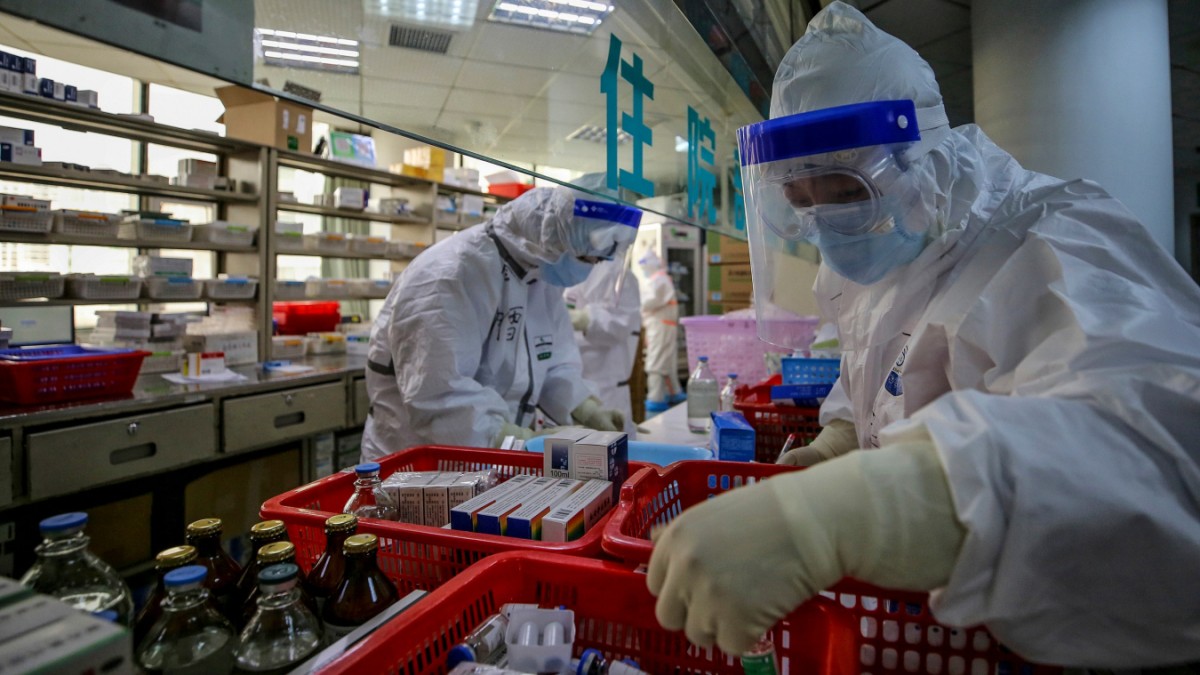First of all, the most important message: So far, there is no effective, safe, approved therapy and also no vaccines against infection with the novel pathogen Sars-CoV-2. If patients with severe courses are treated in the clinic, medical care primarily consists of symptomatic help such as lowering the temperature, sufficient fluids, pain relievers and breathing support. At the moment, doctors cannot do much more for the sick, unless they try unapproved or even experimental therapy.
Numerous approaches are currently being discussed worldwide on how the corona epidemic could be contained by medication, some are wild speculations, but some sound promising. However, promising does not mean that the drugs will soon be available and that the world should stock up on them. Rather, the most important steps are still missing before a drug can come onto the market: testing not only in cell cultures, but also in animal experiments and then – particularly important – clinical trials on dozens, preferably hundreds, of patients.
This time-consuming check is not an unnecessary requirement of narrow-minded authorities, but primarily serves to ensure security. After all, more than 90 percent of all newly developed drugs fail in the crucial clinical phase. What started as a brilliant pharmacological idea, looked theoretically convincing in the model, worked in cell culture and was also effective in animal experiments, often leads to unforeseen side effects and complications in humans and does more harm than good. Two currently intensively discussed candidates for therapy against Covid-19 are presented here.
Scientists from the Primate Center in Göttingen and from the Berlin Charité – including the most popular corona expert in the country, Christian Drosten – have just Trade magazine Cell describedHow a drug from the group of protease inhibitors can prevent coronaviruses from entering the cell. So far, however, detection has not been successful in patients, but only in cell culture. It was infected with viruses that came from the first people infected across Germany: the “Isolate Munich”.
Doctors are also examining drugs that have been developed for other diseases
The infection researchers have recognized that a cellular enzyme – the protease TMPRSS2 – is necessary so that the virus can even get into the lung cell, convert it to the host cell, multiply there and then cause even more harm. A drug that inhibits this protease could be a new treatment option. “We have thus found a starting point for combating the virus,” says Infection Biology Stefan Pöhlmann from the German Primate Center, who was involved in the study.
Camostat Mesilate is the name of the drug that inhibits the uptake of viruses into the cell, at least in the laboratory. In Japan, it has been approved for a long time, but not for the treatment of patients with corona infections, but to treat inflammation of the pancreas. However, previous studies had shown that the substance can also effectively prevent conventional Sars coronaviruses from entering lung cells, i.e. those pathogens that are known from the 2002 outbreak and are closely related to the current coronaviruses.
However, the German researchers are reluctant and only express themselves in the subjunctive about their therapy option. They do not mention the name of the potential virus blocker in the title or in the short summary of their article. However, later in the text, they write that “off-label treatment could be considered for patients infected with Sars-CoV-2”. This means a therapy without approval, as is often the case in pediatrics, obstetrics and oncology, when new forms of treatment are promising but not yet certified or when a new application opens up for known agents.
The substances are intended to prevent viruses from multiplying unchecked
The infection researchers know that their results give reason for hope, but they are far from being evidence that the protease inhibitor is also effective and safe in humans. “Our results suggest that Camostat could also protect Mesilate from the Covid-19 disease,” said Markus Hoffmann, the lead author of the Cell article. “However, this should be investigated in the context of clinical studies.”
Another promising approach in the fight against the corona epidemic is agents that have already been tried on Ebola and other dangerous viruses, for example the drug Remdesivir. The substance is a nucleoside analogue, which means that it is similar to the building blocks of the genetic molecules RNA and DNA. These substances prevent the viruses from multiplying unchecked by their incorporation. Much like a suitable segment would block a zipper from the outside, agents such as remdesivir introduced into the virus RNA stop further replication of the pathogen. This mode of action is comparable to medicines for herpes viruses, such as acyclovir, which have been known for some time.
The first confirmed case of an American infected with Sars-CoV-2 who developed pneumonia about a week later was treated with remdesivir, as doctors from the state of Washington in New England Journal of Medicine reported. Whether the symptoms of the 35-year-old improved dramatically a few days later, or whether it was thanks to the happy course of the disease, cannot be reliably clarified in an individual case. This is one of the reasons why five clinical studies with remdesivir have recently started in China and the USA. The earliest possible indication of whether expectations will be met is a few months from now.
– .

